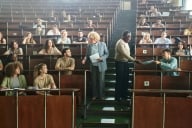You have /5 articles left.
Sign up for a free account or log in.
At the University of Virginia today, a protest is planned over Attorney General Ken Cuccinelli's attempt to obtain records about climate change research conducted there -- an attempt that faculty members view as intimidation of scholars whose findings offend the Republican politician. The university, at the behest of its faculty, has gone to court to block the attorney general's information request, and a decision could come as soon as today.
Also this week, the University of Arizona has infuriated some leading education researchers by turning over some documents for which Tom Horne, the state superintendent of education, had a federal court issue a subpoena. While the university has joined a legal action to block some parts of the subpoena, its partial compliance has scholars saying that their pledges of confidentiality to the institutions they studied are being violated and that the university's response is harmful to education research.
The university gave in "without a fight" and the researchers have "received little or no support" from the administration, according to a letter circulating from Patricia Gándara and Gary Orfield, co-directors of the Civil Rights Project at the University of California at Los Angeles. The UCLA center has been coordinating a major research effort on Arizona's controversial policies about education for schoolchildren learning English, and the research team includes professors at Arizona, such that many records exist there and are subject to the subpoena.
The findings of the UCLA center could bolster the arguments of the Arizonans who are challenging those policies in court, which is why Horne is pushing for access to the records. The UCLA research center has already published the findings, which are particularly critical of rules forcing those learning English to be separated from other students so they can focus solely on English four hours a day. The research has found that this approach has failed to close education gaps among student groups and has effectively amounted to segregation, with a restoration of "Mexican rooms" that once served to separate Latino and Anglo students. (Arizona officials defend their policies as promoting educational quality.)
Horne is seeking all of the raw data behind the study -- even though the research protocols as reviewed by Institutional Review Boards stipulated confidentiality for the teachers, schools and districts that were studied. The university has released district names in its partial compliance. The researchers believe (and their IRBs believed) that the state might retaliate against individual teachers who questioned the state's policies or against the schools or districts employing these teachers.
The claim in the subpoena is that because the researchers are scheduled to testify in the court battle over the state's policies, Arizona officials are entitled to see all the raw data that went into the research. The University of Arizona, in a statement defending its actions in providing some of the data to the state, cited that argument as well.
"The university researchers have agreed to testify as expert witnesses for the plaintiff in this case. Therefore, the information used by those individuals to prepare their testimony is subject to discovery under the applicable federal rules of civil procedure," the statement said. "The university, therefore, responded to the subpoena by providing some of the documents requested but refusing to provide any personally identifiable information related to any of the individuals who participated in the research study interviews and/or surveys. The university is cooperating with the plaintiff’s attorney in seeking a protective order, which is still pending in the federal court, to prevent the disclosure of the names of participating schools, school districts, administrators and teachers."
That doesn't reassure the researchers, who say considerable damage has already been done by making it known which school districts were studied -- in violation of the confidentiality pledges the researchers made.
The letter from Gándara and Orfield notes that state officials have suggested that if the researchers didn't testify, there would be no need to go after their raw data. Their letter calls this "a blatant attempt to get this research out of the trial by making the researchers choose between going to court and putting the districts and schools at risk."
Given that much education research in Arizona involves controversial policies and research subjects who have legal and other reasons to need confidentiality, the scholars warn that turning over any raw data without fighting to protect it "will obviously have a very chilling effect on education research conducted in that state, and in other states, if they can get away with this."
Gary Rhoades, general secretary of the American Association of University Professors (and a faculty member on leave from Arizona), said via e-mail that he was very concerned about the case. He said that the subpoenas "represent disturbing threats to academic freedom, to study participants’ right to anonymity, and to the ability of academics to conduct studies on important policy issues."
He said it was essential for universities to fight such requests for confidential information. "In complying with this subpoena the University of Arizona has failed its responsibility to protect the integrity of faculty members’ research and potentially compromised the anonymity promised to participants, in this case employees in public schools, effectively turning the information over to their statewide boss, Mr. Horne," he said. "The protection of human subjects (in this case from possible retaliation) through the promise of anonymity is called for by institutional and federal policy. The need for such privacy is essential if scholars are to do research on controversial public policy issues."








